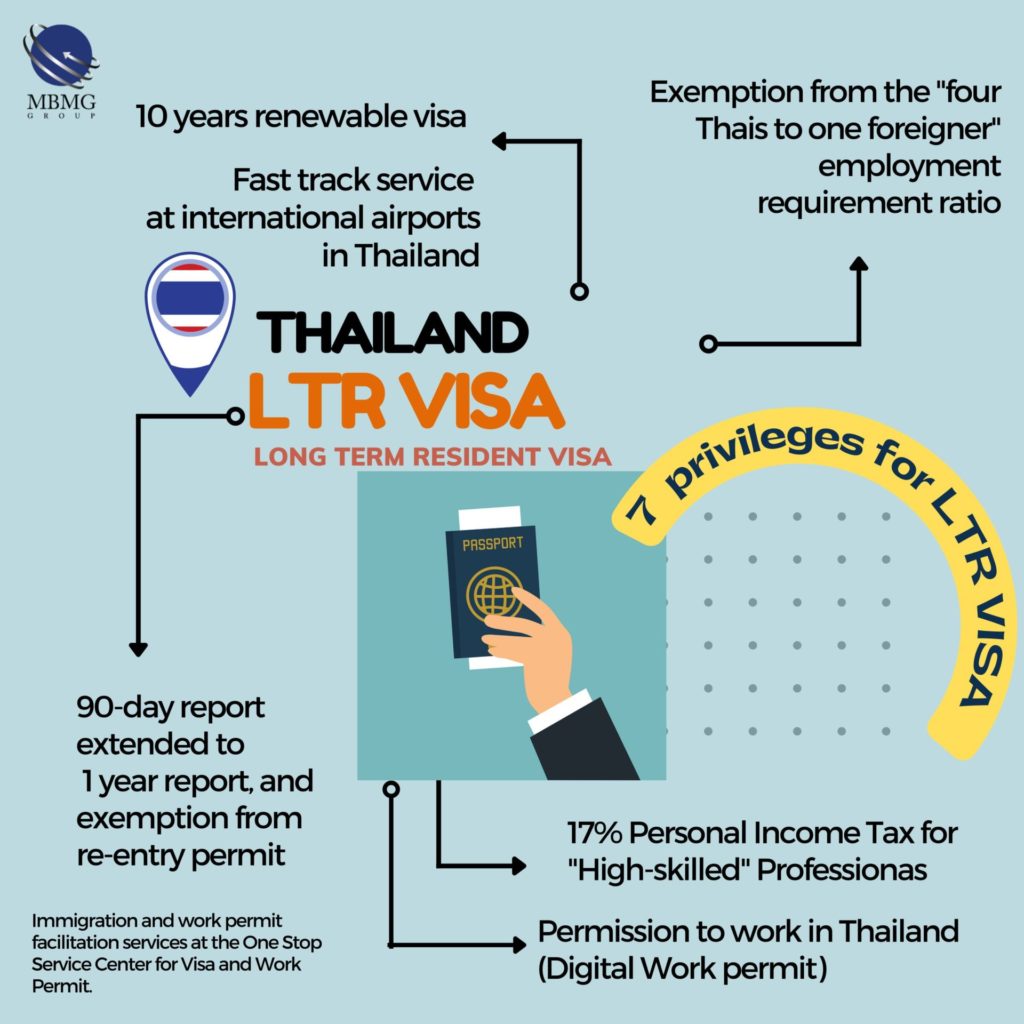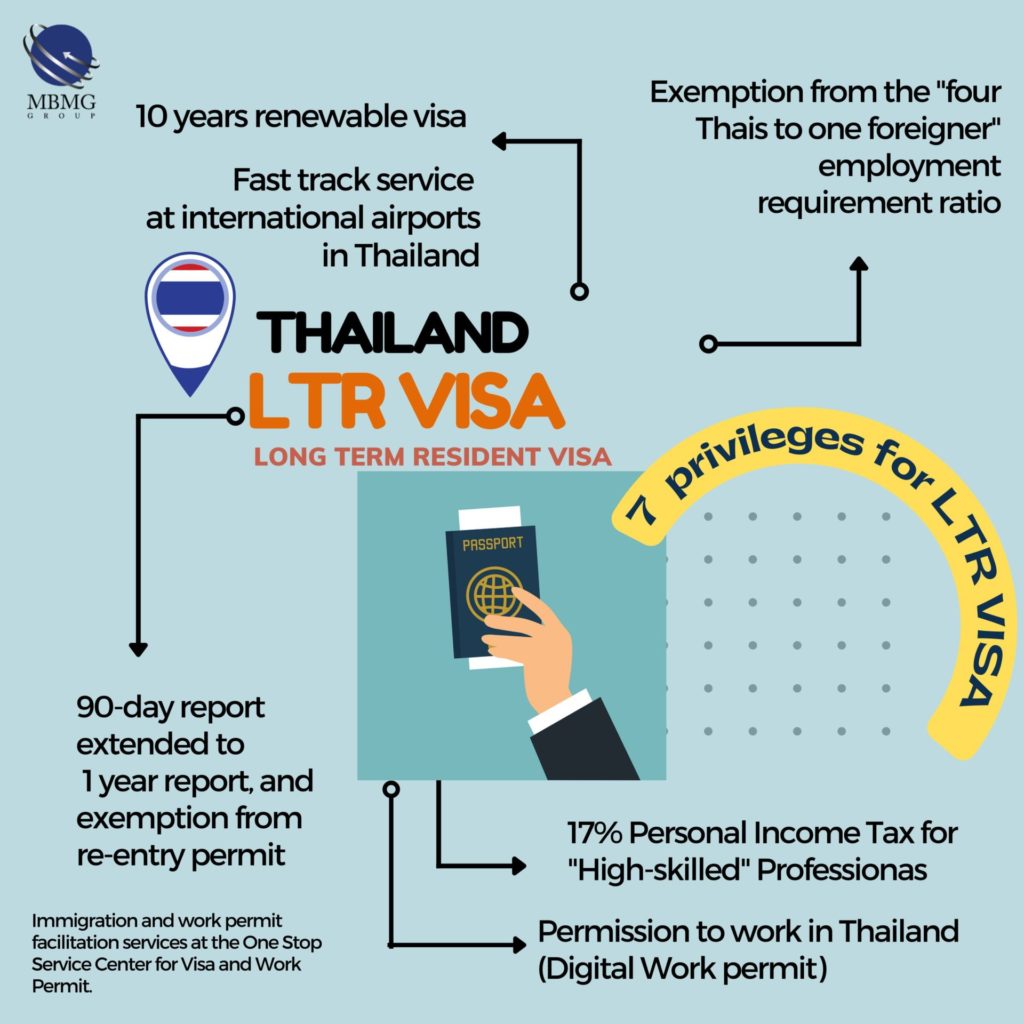Thailand, a land of rich culture, stunning landscapes, and a thriving economy, extends its warm embrace to individuals and families seeking long-term residency. The Long-Term Resident Visa (LTR) program, unveiled recently, is more than just a personal opportunity; it’s a chance for families to create lasting memories and prosperity in the “Land of Smiles.” This comprehensive guide takes a closer look at Thailand’s LTR program with a particular emphasis on the family pack, exploring eligibility criteria, privileges, and the unique benefits it offers families seeking a brighter future together.

Eligibility Categories and Requirements:
Wealthy Global Citizens: This category targets individuals with substantial assets and investments in Thailand. They must have assets valued at a minimum of $1 million, a minimum annual income of $80,000 over the past two years, and investments totaling at least $500,000 in Thai government bonds, real estate, or direct investments in Thailand.
Wealthy Pensioners: This category is designed for retirees aged 50 and above with a stable annual pension or income. They should have a minimum yearly passive income of USD 80,000 . Alternatively, if their income is between USD 40,000 and USD 80,000, they must invest at least USD 250,000 in Thai government bonds, real estate, or direct Thai investments.
Professionals Working Remotely: This category targets remote workers employed by well-established overseas companies. For the past two years, they must have a minimum personal income of USD 80,000 per year. If their income falls between USD 40,000 and USD 80,000, additional criteria such as a master’s degree, ownership of intellectual property, or having received Series A funding may apply.
Highly Skilled Experts: This category is for professionals or experts in specialized fields working for Thai entities, government agencies, research centers, or technical training institutions. The minimum personal income and academic qualifications vary based on income levels and job roles.
Targeted Industries:
The LTR program encourages experts to work in specific industries considered targeted for economic growth in Thailand. These industries include automotive, electronics, tourism, agriculture, transportation, automation, biofuels, digital, medical, defense, and more.
General Privileges: LTR Visa holders are granted a 10-year renewable visa, work permission without the requirement to hire Thai citizens, fast-track services at international airports, annual reporting instead of 90-day reporting, and unlimited re-entry without a re-entry permit.
Tax Benefits: Highly skilled professionals enjoy a flat 17% tax rate on employment income. Income tax exemption is provided for Wealthy Global Citizens, Wealthy Pensioners, and Professionals Working Remotely on certain income earned from abroad.
Application Process:
Online Application: The journey begins on the program’s website, where applicants can complete the necessary forms online. Families can submit joint applications, making it convenient for everyone to apply together.
Document Submission: While applying online, ensure you gather the specific documents required for each family member, including passports, financial statements, and any additional documents relevant to your chosen category within the LTR program. These documents may vary depending on your family’s circumstances, so reviewing the program’s official guidelines carefully is essential.
Processing Time: The program typically aims to process applications within approximately 20 business days. However, it’s important to note that this timeline may be extended if additional documents or information are requested. Be prepared for potential variations in processing times.
Application Review: During the review process, the authorities will evaluate your eligibility based on the chosen category (e.g., Wealthy Global Citizens, Wealthy Pensioners, Professionals Working Remotely, Highly Skilled Experts). Ensure that all your documents are accurate and current to expedite the review.
Visa Issuance Appointment: Once your application is approved, applicants, along with their family members, must schedule a visa issuance appointment at designated centers. This appointment is a crucial step in securing your Long-Term Resident Visa.
Visa Fee: Be prepared to pay the visa fee during your visa issuance appointment. The price may vary depending on whether you apply within Thailand or at Thai embassies/consulates abroad. It may also depend on the exchange rate in your country.
Arrival in Thailand: Upon receiving your Long-Term Resident Visa, you and your family can travel to Thailand. Enjoy the warm hospitality and vibrant culture as you begin your journey towards long-term residency together.
Work Permits:
Thailand’s Long-Term Resident Visa (LTR) program not only offers families the opportunity to build a future together but also paves the way for professional growth and career development. In this guide, we delve into the intricacies of work permits for LTR visa holders, shedding light on the process and timing, particularly as it relates to families. Whether you’re a highly skilled professional aiming to hit the ground running or a family member seeking employment opportunities, this comprehensive overview will help you understand how to navigate the work permit process under Thailand’s LTR program.
Highly-Skilled Professionals: If you fall into the category of Highly-Skilled Professionals, your journey is streamlined. Typically, you will receive your work permit concurrently with your Long-Term Resident Visa. You can begin your employment or entrepreneurial ventures in Thailand without delay. For families, this means that if the primary applicant is a highly skilled professional, spouses, and eligible family members can also access work permits without extensive waiting periods.
Other Categories: For LTR visa holders falling into categories such as Wealthy Global Citizens, Wealthy Pensioners, or Professionals Working Remotely, the process for obtaining work permits may vary. While these categories prioritize different criteria, including financial status and employment arrangements, the good news is that work permits are indeed accessible. The specific timeline for obtaining these permits may require additional steps after your initial visa approval.
Work Permit Application: For family members seeking work permits, the application process typically involves providing the necessary documentation and details about your intended employment in Thailand. This may include job offers, employment contracts, or other relevant documents.
Processing Duration: The duration for processing work permits can vary but often falls within a reasonable timeframe. It’s essential to initiate this process promptly if you plan to work in Thailand, mainly if your category necessitates it.
Temporary Work Permission: While your work permit application is under review, rest assured that LTR visa holders are usually permitted to work in Thailand temporarily. This means you can explore job opp
Financial Requirements for Dependents:
Thailand’s Long-Term Resident Visa (LTR) program promises families a brighter future together. While the program warmly welcomes dependents to join the primary visa holder, one question often arises: What are the financial requirements for family members? In this guide, we explore the financial considerations for dependents under Thailand’s LTR program, shedding light on what you need to know as you plan your family’s journey to long-term residency in the “Land of Smiles.”
Financial Criteria Similar to Primary Applicant: While the provided information does not specify the exact financial requirements for dependents, it’s common in similar visa programs for family members to meet financial criteria identical to those of the primary visa holder. These criteria often include demonstrating financial stability and supporting oneself in Thailand.
Consideration of Family Size: Depending on the size of your family and the number of dependents you plan to include under the LTR program, the financial criteria may vary. It’s essential to clearly understand your family’s financial situation and be prepared to provide documentation supporting your family’s financial security.
Supporting Documentation: When applying for the LTR program as a family, you may be required to provide documentation demonstrating your family’s financial stability. This documentation can include bank statements, income certificates, proof of assets, and other financial records that showcase your ability to support your family during your stay in Thailand.
Flexibility by Category: Remember that the specific financial requirements may vary depending on the category under which the primary visa holder applies. For example, Wealthy Global Citizens, Wealthy Pensioners, Professionals Working Remotely, and Highly Skilled Experts may have different financial criteria for both the primary applicant and their dependents.
Health Insurance and Other Requirements:
Thailand’s Long-Term Resident Visa (LTR) program is not only about residency but also about ensuring your and your family’s well-being. This guide explores the crucial health insurance and other requirements under Thailand’s LTR program. We highlight how families can meet these prerequisites as they embark on their journey to long-term residency in the “Land of Smiles.”
Health Insurance Coverage: Under Thailand’s LTR program, all applicants, including family members, are required to have health insurance coverage with a minimum limit of $50,000 . This coverage is a vital safety net that ensures access to quality medical care and protection against unexpected health expenses during your stay in Thailand.
Social Security Benefits: Besides health insurance, applicants are encouraged to have social security benefits covering medical treatments in Thailand. These benefits can provide additional financial security and peace of mind, knowing that you and your family are well-covered in medical emergencies.
Minimum Deposit: Alternatively, applicants, including dependents, have the option of making a minimum deposit of USD 100,000 . The minimum deposit requirement for family members is reduced to USD 25,000 per dependent. This deposit serves as a financial safety net, ensuring that you have the means to support yourselves and meet any unforeseen expenses during your stay.
Comprehensive Family Coverage: It’s important to consider comprehensive family coverage when planning for health insurance and other requirements. Ensure that your health insurance policy extends range to all family members included in your LTR program application, providing peace of mind for the entire family’s well-being.
Verification and Documentation: When applying for the LTR program, be prepared to provide documentation that verifies your compliance with these requirements. This documentation may include proof of health insurance coverage, details of social security benefits, or evidence of the minimum deposit.
In the heart of Southeast Asia, Thailand invites families to embark on an extraordinary journey. With its family-friendly approach, the LTR program ensures that you and your loved ones can create a home in this vibrant and culturally rich nation. Whether you’re a retiree seeking tranquility, a remote worker embracing digital nomadism alongside your family, a skilled expert in cutting-edge industries, or a global citizen with financial prowess looking to build a future together, Thailand’s LTR program welcomes you with open arms. As you embark on this journey to long-term residency, remember that Thailand’s rich culture, dynamic economy, and warm hospitality are not just for you – they are for your family to cherish and thrive in.
In conclusion, Thailand’s LTR Visa program offers various eligibility categories, targeted industries, and privileges to attract wealthy individuals, retirees, remote workers, and highly skilled experts to the country. While the program allows for the inclusion of family members, specific financial and documentation requirements for dependents are not detailed in the provided information. Potential applicants should consult official sources and authorities for the most up-to-date and detailed program requirements.

Leave a Reply